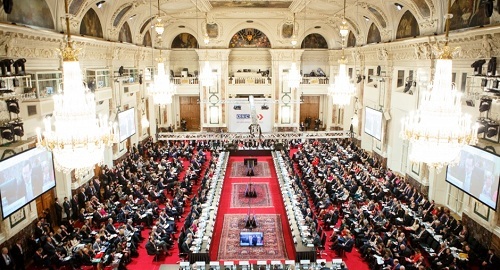| Georgia in OSCE Ministerial Council Statements |
| Civil Georgia, Tbilisi / 8 Dec.'17 / 18:08 |

Participants during the opening session of the 24th OSCE Ministerial Council, Vienna, December 7, 2017. Photo: OSCE/Salko Agovic
Foreign Ministers and senior diplomats of several participating states of the Organization for Security and Cooperation in Europe (OSCE) made statements on Georgia in their addresses at the 24th Ministerial Council on December 7-8.
Below are the Georgia-related excerpts from their statements.
Azerbaijan, Foreign Minister Elmar Mammadyarov: In conclusion, as it was stated today by a number of speakers, in OSCE area in addition to blatant violation of Azerbaijan’s territorial integrity, sovereignty and internationally recognized borders, we observe also similar situation in Ukraine, Georgia and Republic of Moldova.
Canada, Foreign Minister Chrystia Freeland: Canada also stands with Georgia and Moldova when they call for their sovereignty and territorial integrity to be respected.
Estonia, Foreign Minister Sven Mikser: Let me also say that it is of utmost importance to stay committed to finding peaceful resolution for other protracted conflicts in Nagorno-Karabakh, in Georgia and in Moldova.
European Union, Secretary General of the European External Action Service Helga Schmid: Regrettably, the OSCE region also faces other protracted conflicts in Georgia, in the Republic of Moldova, and the Nagorno-Karabakh conflict … The EU continues to be engaged on the ground, in particular in Georgia through the EU monitoring mission and in the framework of the Geneva International Discussions, to contribute to resolve the situation.
Finland, Foreign Minister Timo Soini: OSCE continues to provide key principles for rule-based international order. The ongoing conflict in Ukraine is a result of non-compliance of these principles … Neither should we forget the protracted conflicts in Georgia, Moldova and Nagorno-Karabakh.
Czech Republic, Deputy Foreign Minister Ivo Šrámek: The Czech Republic also fully supports the OSCE role in addressing the protracted conflicts in Georgia, Republic of Moldova and in and around Nagorno-Karabakh, including the established negotiating formats and their efforts to reach sustainable political solutions in line with OSCE principles.
Lithuania, Foreign Minister Linas Linkevicius: Lack of progress around resolution of protracted conflicts in Georgia, Moldova and over Nagorno-Karabakh is continuously undermining the security of the OSCE region.
Montenegro, Foreign Minister Srdjan Darmanović: In Georgia, Moldova and Azerbaijan, some positive signs have been made. It is essential to move from the dangerous nature of the status quo towards the peaceful settlement based on the fundamental principles of the UN Charter and Helsinki Final Act.
Norway, Deputy Foreign Minister Audun Halvorsen: As in the case of Crimea, we also call for unimpeded access for international humanitarian and human rights mechanisms to Georgia’s regions of Abkhazia and South Ossetia. The situation for parts of the local population is increasingly dire.
Poland, Deputy Foreign Minister Bartosz Cichocki: I would like to be understood correctly – Donbas and Crimea are a number one challenge, but we should not turn a blind eye on other conflicts in the OSCE area. Therefore, we have to reaffirm our full commitment to solving protracted conflicts in Nagorno-Karabakh, Moldova and Georgia. With regard to the latter, we believe that the OSCE should play a more significant role in conflict resolution.
Portugal, Secretary of State of Foreign Affairs and Cooperation Teresa Ribeiro: We strongly support the Organization’s effort aimed at reaching sustainable political solutions to the so called protracted conflicts in Georgia, the Republic of Moldova and Nagorno-Karabakh.
Romania, Deputy Foreign Minister George Ciamba: The crisis in and around Ukraine has dominated our agenda, and it continues to do so by undermining the overall stability in Europe, as well as the already fragile security environment around the Black Sea, marked by the protracted conflicts in the Republic of Moldova, Georgia and Nagorno-Karabakh. Full respect of international law and the OSCE principles and commitments, including the sovereignty and territorial integrity, and independence of Ukraine, is paramount to overcome the crisis.
Russia, Foreign Minister Sergey Lavrov: We call upon the OSCE, within the framework of the Geneva discussions on the Transcaucasia, to facilitate approving the document with the commitment to no use of force between Georgia and Abkhazia or South Ossetia. All problems of Transcaucasia should be resolved exclusively by peaceful means.
Sweden, Foreign Minister Margot Wallström: Today, we see severe challenges to what we have agreed: the deteriorating situation for human rights in the region; the protracted conflicts in Georgia, Moldova and Nagorno-Karabakh; and not least, Russia’s aggression against Ukraine, its illegal annexation of Crimea and its direct involvement in destabilizing military activities in Eastern Ukraine.
Switzerland, Federal Councillor Ignazio Cassis: In the meantime, we must make sure that the assistance to the Ukrainian people does not decline. Switzerland will increase its humanitarian assistance in eastern Ukraine and will continue to help people on both sides of the Contact Line. We also support the efforts of the OSCE towards a peaceful solution of the conflicts in Georgia and Nagorno-Karabakh.
Ukraine, Foreign Minister Pavlo Klimkin: Besides the hot conflict, protracted conflicts in the OSCE area continue to pose serious risks to security. We need to increase our efforts for peaceful resolution of these conflicts on the territories of Georgia, Republic of Moldova and Republic of Azerbaijan with full respect for their sovereignty and territorial integrity.
United Kingdom, Minister for Europe and the Americas Alan Duncan: First and foremost we must restate our ongoing concern about the violations of the OSCE’s principles and commitments which are evident in Russia’s illegal annexation of Crimea and its destabilization of the Donbass not to mention ten years of continued violations of the sovereignty and territorial integrity of Georgia.
United States of America, State Secretary Rex Tillerson: We must make progress on ending the long-running conflict in Georgia and Moldova, as well as in Nagorno-Karabakh … We welcome the recent 5+2 talks on Moldova. However, we must condemn Russia’s efforts to stifle access to Abkhazia and South Ossetia regions of Georgia.
